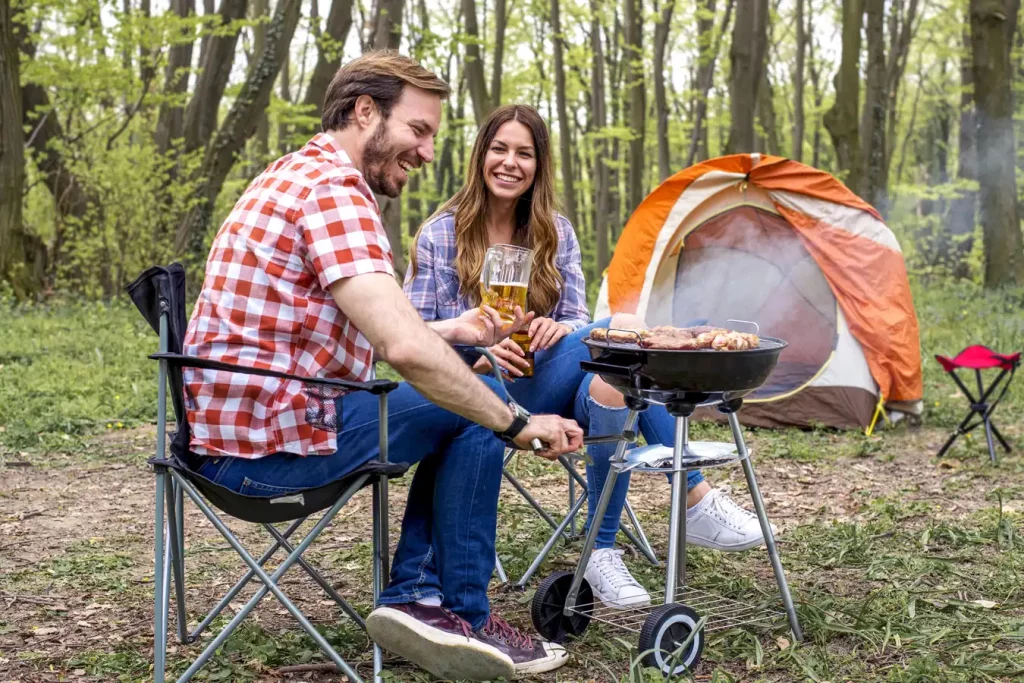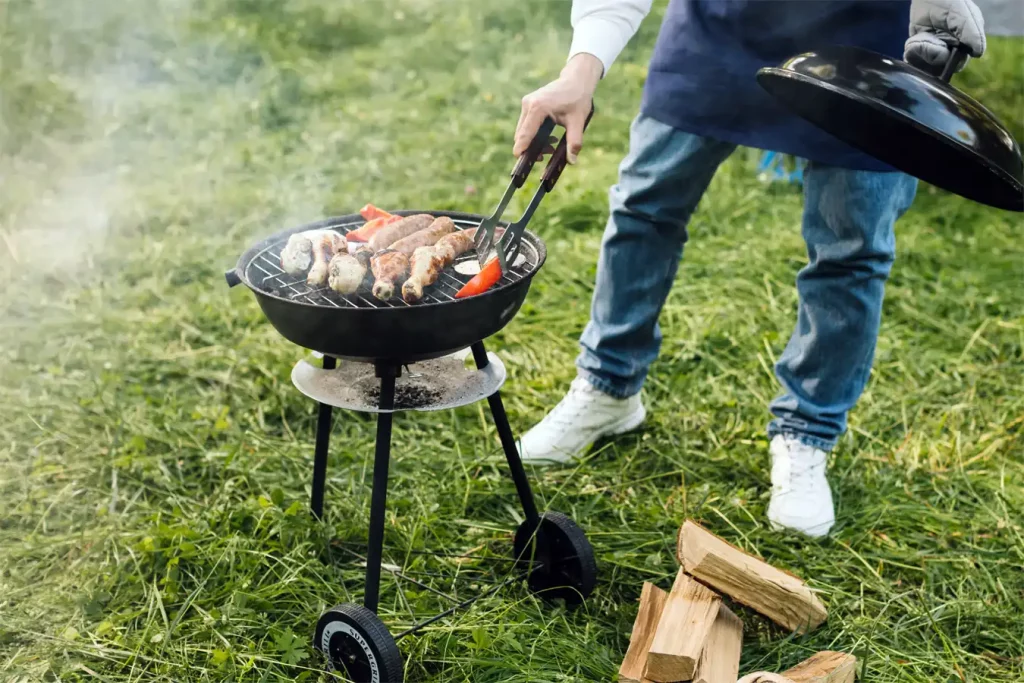“Can you grill when it's windy?”
You've probably asked yourself this question more times than you can count.
In this article, we're diving into the do's and don'ts of grilling in windy conditions.
Brought to you by Ovi Tanchangya, a passionate blogger and outdoor enthusiast, this guide is guaranteed to get you excited about your next grilling adventure, regardless of the weather!
Brace yourselves, for a journey full of sizzling sounds, smoky flavors, and expert tips.
Our mission? Ensuring your barbecue doesn't miss a beat, even when the winds are howling!
The Effects of Wind on Grilling
Grilling is an art, and like any art, it requires an understanding of its environment. When it comes to grilling, wind can be a tricky element to navigate. It can affect your grill's temperature, your safety, and even the taste of your food. Let's break this down.
How Wind Influences the Heat of the Grill
Think of your grill as an open-air oven. When it's windy, the air circulating around your grill can pull heat away, causing temperature fluctuations. Imagine trying to preheat your oven with the door open – it would take longer and use more energy, right? The same concept applies to your grill. If it's windy, you may find that your grill is struggling to reach and maintain the desired temperature. This could mean you'll be using more fuel, whether it's propane, charcoal, or wood, to keep that heat going.
Safety Concerns When Grilling in Windy Conditions
Grilling on a windy day isn't just about controlling temperature – it's also about safety. Heavy gusts can knock over grills, particularly those lightweight or poorly stabilized ones, causing potential fire hazards. Also, embers from a charcoal grill could be blown around, sparking a fire in the wrong place. And of course, wind can blow loose clothing, hair, or other flammable items into the flame. Safety should always come first when grilling, especially in challenging weather conditions.
The Impact on Cooking Time and Flavor
Ever noticed how windy conditions can make your grilling take longer? That's because wind can cause your grill to lose heat faster than it can produce it. This, in turn, extends the cooking time for your food. And while you might think a little extra grilling time won't hurt, it can actually have an impact on the flavor. If your food is on the grill for longer than necessary, it can dry out, leaving you with less-than-juicy results.
Moreover, the wind can also affect the smoke produced by your grill, altering the smoky flavor that is the hallmark of a good barbeque. High winds may disperse the smoke too quickly, depriving your food of that unique grilled flavor.
Determining Whether It's Safe to Grill
Grilling on a breezy day doesn't need to be off-limits, but safety should always come first. There are a few key factors to consider before you fire up the grill and toss on those burgers. So, let's dive into what you need to assess before grilling on a windy day.
Assessing Wind Speed and Direction
Before you begin grilling, take a moment to evaluate the wind's speed and direction. If the wind is whipping up dust and debris, or if tree branches are swaying heavily, it may be too dangerous to grill. Also, observe the wind direction. A wind coming from the wrong direction could blow smoke, embers, or even flames where you don't want them, creating potential safety risks.
Evaluating Your Grilling Location and Surroundings
Look around your grilling area. Is it surrounded by flammable materials? Things like dry grass, wooden decks, or outdoor furniture could potentially catch fire from a stray ember. If you're grilling in a windy environment, ensure you're well away from any potential fire hazards. Choose a stable, flat surface to set your grill and make sure it's well-anchored to prevent it from being knocked over by strong gusts.
Knowing Your Grill's Limits
Different types of grills have different tolerances for wind. Lightweight grills or those without a good seal may struggle to maintain heat in even the mildest breeze. On the other hand, heavier, well-insulated grills might withstand stronger winds without too much impact on cooking performance. Know your grill's limits and make decisions based on its capabilities and the current weather conditions.
Tips for Grilling in Windy Conditions
Alright, so you've determined it's safe to grill despite the wind. But how do you go about it without sacrificing the quality of your barbecued delights? Here are some expert tips to help you get the most out of your windy day grilling.

Adjusting Grill Placement and Orientation
The direction your grill faces can make a significant difference when it's windy. Position your grill perpendicular to the wind to minimize heat loss. This orientation helps to shield the burners, allowing your grill to maintain a more stable temperature.
Using Windbreaks to Shield Your Grill
A windbreak can be a game-changer when it comes to grilling in the wind. You can use something as simple as a large piece of cardboard or a foldable screen to block the wind. Just make sure whatever you use is non-flammable and secure so it doesn't topple onto your grill.
Modifying Grill Temperature and Cooking Times
Since wind can cause your grill to lose heat, you may need to adjust the temperature and cooking times. Turn up the heat slightly to compensate for the heat loss, but remember to monitor your food closely to avoid overcooking.
Making Use of the Grill Hood
Keeping the grill hood closed as much as possible can help maintain a consistent cooking temperature, especially when it's windy. The hood acts as an insulator, trapping the heat inside the grill and ensuring your food cooks evenly.
Wind or no wind, grilling should always be an enjoyable experience. With these tips, you can confidently grill in windy conditions and still end up with delicious, flavor-packed results. After all, a little wind never stopped a true grilling enthusiast!
Learn more: How to Secure Grill From Wind
Advanced Grilling Techniques for Windy Weather
There's a certain thrill that comes from rising to the challenge and succeeding against the odds. Grilling in windy conditions can feel like that. With a few advanced techniques under your belt, you can navigate these conditions like a pro and still deliver an excellent barbecue experience. Let's explore these advanced strategies.
Cooking with Indirect Heat
One way to manage the unpredictability of the wind is by utilizing indirect heat. This involves heating one side of the grill while placing the food on the other side. This method offers slower, more even cooking, minimizing the chances of your food getting burned due to temperature fluctuations caused by the wind. It's perfect for larger pieces of meat that need longer cooking times.
Using a Water Pan to Stabilize Temperatures
A water pan can be a griller's best friend in windy conditions. This technique involves placing a pan filled with water on the grill to help stabilize the temperature. The water absorbs and retains heat, helping to counterbalance any heat loss due to wind. Plus, the steam generated can keep your food moist.
Selecting the Right Type of Fuel
Your choice of fuel can also impact your grilling success in windy weather. Charcoal, for example, might be challenging to light and maintain in windier conditions. Gas grills, on the other hand, are easier to control and adjust to compensate for wind-induced heat fluctuations.
Recognizing When It's Better to Postpone Your Grilling
Grilling is an art that often requires perfect conditions to get it right. However, knowing when to postpone your grilling plans is just as important as mastering the grilling techniques. There are times when the weather conditions simply aren't conducive to safe or effective grilling.
Safety Red Flags That Signal a Need to Postpone
While we all love a good barbecue, safety should never be compromised. Heavy winds that cause debris to fly about or make it difficult to stand or walk around safely are clear signs to postpone your grilling plans. Similarly, if the wind is causing uncontrollable temperature swings or creating a risk of spreading flames or embers, it's better to wait for calmer weather.
Alternative Indoor Cooking Options
If the weather forces you to postpone your grilling plans, don't worry. You still have plenty of indoor cooking options. You can roast your meat in the oven, cook it on a stovetop grill pan, or use an indoor electric grill. While you might miss the smoky flavor of an outdoor grill, these methods can still yield tasty results. Plus, they offer the chance to experiment with different cooking techniques and flavors.
FAQs about Can Grill When It’s Windy
Can it be too windy to grill?
Absolutely, if the wind is strong enough to cause uncontrollable temperature swings, spread flames or embers, or create unsafe conditions, it's too windy to grill safely.
When should you not grill outside?
You should not grill outside during extreme weather conditions, such as heavy winds or storms, or when there's a risk of spreading fire due to dry conditions.
How do you use a gas grill on a windy day?
Using a gas grill on a windy day involves assessing wind direction and adjusting the grill accordingly, using windbreaks, modifying cooking times, and utilizing the grill hood for heat control.
Is it OK to grill in cold weather?
Yes, it is okay to grill in cold weather. However, you may need to make certain adjustments such as preheating the grill longer, monitoring the grill temperature more frequently, and potentially using more fuel to maintain heat.
How do you start a grill on a windy day?
Start a grill on a windy day by positioning it perpendicular to the wind, using wind barriers, and maintaining a steady temperature.
How do you use a charcoal grill in the wind?
Use a charcoal grill in the wind by placing it in a sheltered location, using a wind guard, and closely monitoring the temperature.
How do you know if it's too windy to burn?
It's too windy to burn when you can't control the flames, embers are blowing away, or when local weather advisories discourage open burning due to wind.
What is considered too windy to burn?
Winds above 15 miles per hour are typically considered too windy to burn safely, but local regulations may vary.
Conclusion
Grilling is more than just cooking—it's an art form that many enjoy regardless of the weather. However, as we've discovered, grilling in windy conditions can present some unique challenges. But with the right strategies and safety measures, you can enjoy your barbecue even when the weather doesn't seem cooperative.
So, what's next? Don your grilling apron, arm yourself with these wind-combatting tips, and step into your next windy day grilling adventure with confidence. As always, safety comes first, so be sure to reassess the situation when necessary and never be afraid to postpone if conditions become too treacherous. Now, let's grill on!
Read next: How to Connect Weber Natural Gas Grill to Gas Line


